- 한국어
- English
- 日本語
- 中文
- العربية
- Español
- Français
- Deutsch
- Pусский
- Tiếng Việt
- Indonesian
|
Monthly KOREA’s January 2019 issue. ▶ Link to Webzine |
Street Food Bringing People Together
Tteokbokki, a food you can eat quickly and easily on the street, is seen everywhere in Korea. Interestingly enough, every restaurant and vendor offer their own unique spin on the popular snack. Now it has evolved to be one of the most popular delivery and late night foods in Korea. The personality of tteokbokki is ever changing.
Written by Hwajeong L. Trunkett / Photographed by Studio Kenn
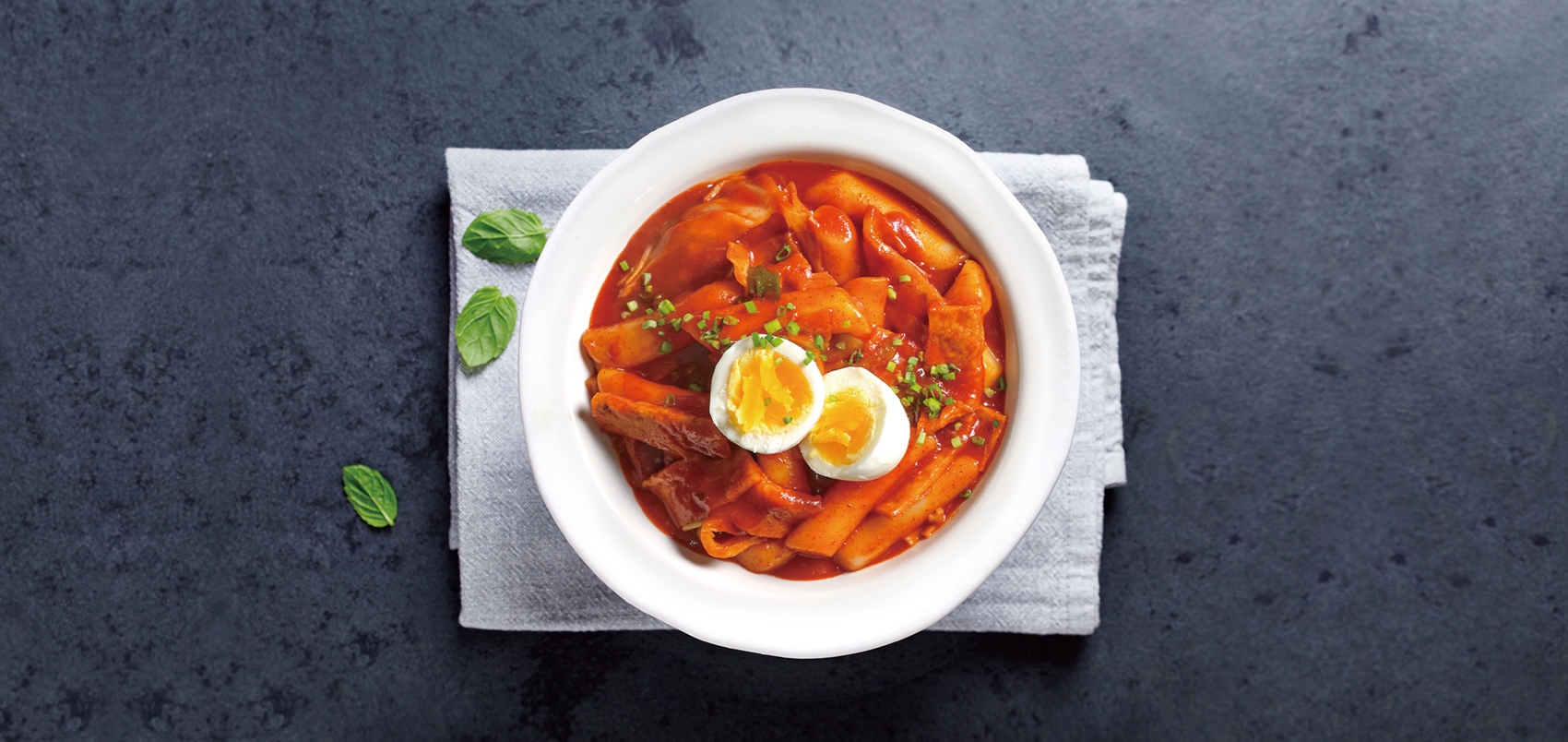
Expanding Variety
Tteok means rice cake and bokki stir-fried food. Combining these two words forms the term tteokbokki, or “stir-fried rice cake.” Ask Koreans what food makes them most nostalgic about their childhood and tteokbokki is the first thing they’ll say. Street vendors that sell the snack with eomuk (fish cake) on a stick are ubiquitous on Korea’s streets, attracting passersby especially in the cold winter. This is because the sweet and savory taste with a bit of a spicy kick remains irresistible to many Koreans, along with a chewy texture. For only a few dollars you can fulfill your need to snack, which makes it all the more tempting. Tteokbokki has evolved into a more fancy meal served in a huge pot full of ingredients like dumplings, vegetables, noodles and sausages. Sharing the food in one pot makes tteokbokki the perfect food for friends and family. It’s also a popular late-night snack available for delivery.
There is no better food than tteokbokki that can be perfectly customized to one’s taste. The tteok itself, which was initially made with only rice, now can come stuffed with different ingredients like cheese or sweet potato or made with flour to make it lighter and absorb sauce better. A personal touch can also be added through the sauce of choice. Gochujang (fermented pepper paste) is the basic sauce base but jjajang (sweet black bean sauce) or curry produces a completely different but unique taste. Western-inspired sauce includes carbonara that is more creamy and cheesy. Name any sauce and you’ll be surprised to see how much it changes the flavor yet maintains the essence of tteokbokki.
The level of personalization for this versatile food doesn’t end there. To make it even more filling and substantial, dip some deep fried sweet potato, laver rolls or squid in the thick red sauce. You can even add instant ramen noodles or vermicelli as an additional bonus for volume, flavor and texture. Also, pair it with gimbab (seaweed rice rolls) and you’ve got a feast.
Learning Each Other’s Culture
For the cooking class, the tteokbokki recipe was prepared in a more traditional way. With this recipe on hand, you can tweak and change to your liking. An international couple, Hanol from Korea and Roger from the U.S., joined today.
Sharing and learning each other’s culture is a daily event for them. That’s why today’s cooking class was extra special: the first time they both made Korean food together. Roger said he saw tteokbokki every time he goes out and never thought about making it himself. He was glad he finally had chance to learn. “I visit my parents back to my home country every now and then, and next time I do, I should definitely make it for my family. I think they will be surprised,” he said. Hanol also said, “I’m excited to finally have chance to cook together. We like going out to find nice restaurants but making good food together feels more meaningful. It will be fun!”
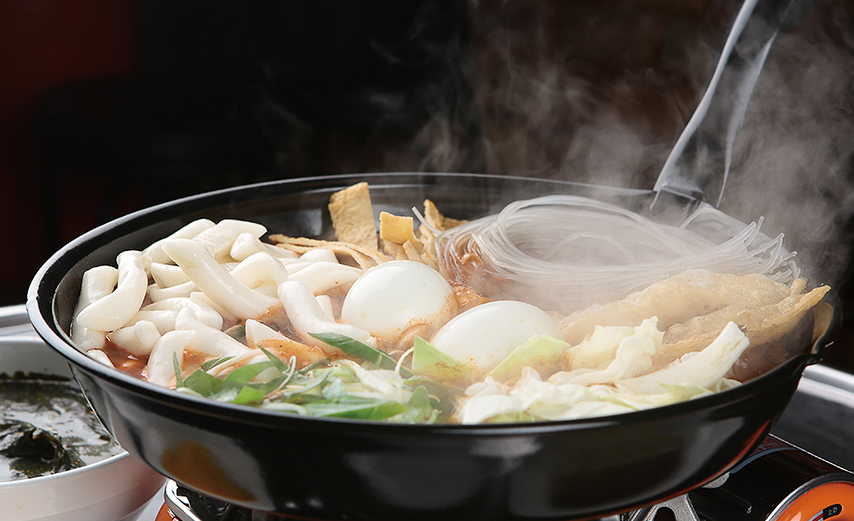
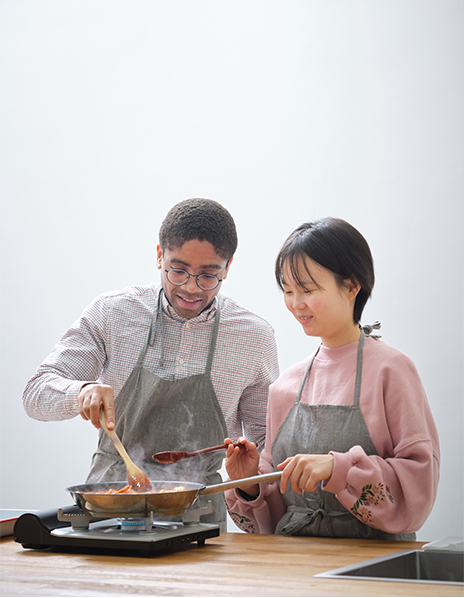
Additional vermicelli or instant ramen noodles are bonus to the volume, texture and taste of tteokbokki. © Shutterstock(left)
Both Hanol and Roger were excited to cook Korean food together.(right)
Teamwork Makes Food Special
You will be surprised to see how easy and simple tteokbokki is to make. To start off, we prepared some ingredients first. Rice cakes usually come hard and need to be soaked in water for a little bit. We cut some flat fish cake sheets into a diagonal shape and cut cabbage slightly bigger than the fish cakes. While Roger put gochujang and sugar into the boiled water that was separately prepared, Hanol kept stirring it to prevent the pepper paste from getting lumpy. When it was well mixed, we scooped out rice cakes from the water and put them in the sauce. Be careful here, rice cakes like to stick to the pan, so they should constantly be stirred. In a couple of minutes, we also put prepared fish cakes, cabbage and green onions, soy sauce and pepper powder.
“If you want to feel the texture of crunchy cabbage with chewy rice cake, you need to put the cabbage at the very last moment,” the instructor added. “Why do we put soy sauce and pepper powder when we already used pepper paste?” When Hanol asked this question, the instructor answered that it is a way to adjust salt and spicy level and enhance the flavor. The last step was to add a spoon of corn syrup to make it sweeter and look more appetizing. As simple as that, the food was complete.
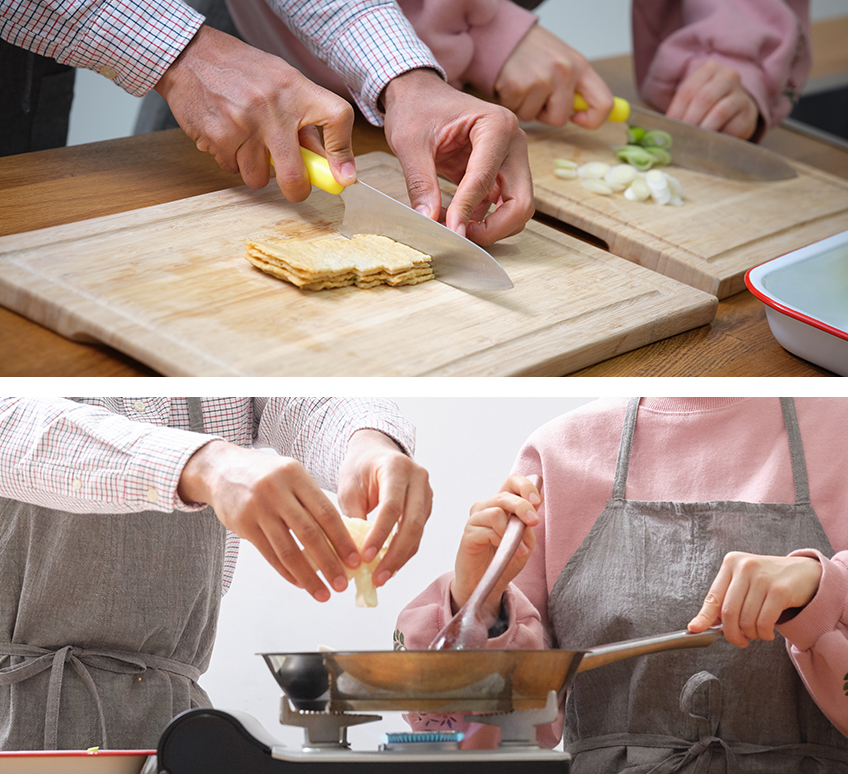
(Top) Roger is cutting fish cake sheets into a small size.
(Down) While Hanol keeps stirring the sauce, Roger carefully adds rice cakes into the pan.
During the class, experienced home chef Hanol took care of Roger so he could understand all the steps, explaining the ingredients in detail. Roger’s lively personality and detailed descriptions of how everything looked and sounded kept everyone’s spirits lifted: “This red sauce looks like a volcano!” “These green speckles of green onions in the red sauce look like a painting!” The inviting red glow of tteokbokki and its provocative taste accentuated the results of their teamwork.
“If I knew making tteokbokki is this easy, I would’ve made it myself instead of always getting delivery,” Roger said. “There are many holidays and birthdays coming up in January, I should definitely give it a try making it again with Roger and invite close friends,” Hanol also added.
Cooking Tips
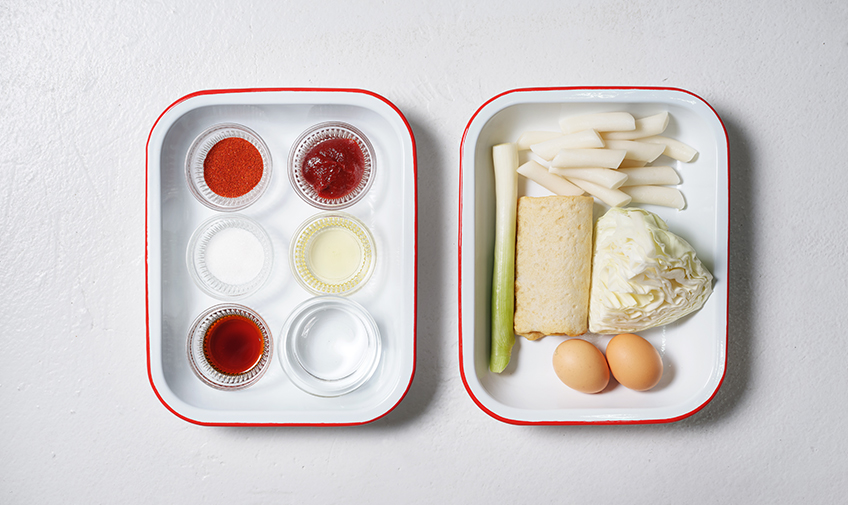
Ingredients for tteokcokki
300 grams of tteok (rice cake), 2 sheets of eomuk (fish cake), handful of cabbage, stalk of green onion, 4 Tbsps of gochujang (red pepper paste), 1 Tbsp of pepper powder, 3 Tbsps of sugar, 1 Tbsp of soy sauce, 1 Tbsp of corn syrup, 2 cups of water, 2 boiled eggs (optional)